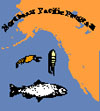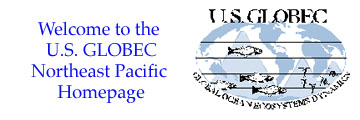
About U.S. GLOBEC
Gateway to U.S. GLOBEC
Online Datasets

Program in a Nutshell
Goal:
To understand the effects of climate variability and climate change on the
distribution, abundance and production of marine animals (including
commercially important living marine resources) in the eastern North Pacific. To embody this
understanding in diagnostic and prognostic ecosystem models, capable of capturing the ecosystem response
to major climatic fluctuations.
Approach:To study the effects of past and
present
climate
variability on the population
ecology and population dynamics of marine biota and living marine
resources, and to use this
information as a proxy for how the ecosystems of the eastern North Pacific
may respond to future
global climate change. The strong temporal variability in the physical
and biological signals of the NEP will be used to examine the biophysical
mechanisms through
which zooplankton and salmon populations respond to physical forcing
and biological interactions in the coastal regions of the two gyres.
Annual and interannual variability will be studied directly through
long-term observations and detailed process
studies; variability at
longer time scales will be examined through retrospective analysis
of
directly measured and proxy data. Coupled biophysical models of
the
ecosystems of these regions will be developed and tested using the
process studies and data collected from the long-term observation
programs, then further tested and improved by hindcasting selected
retrospective data series.
Serving U.S. GLOBEC Northeast Pacific Data.
As of 23 November 1999, we begin to serve U.S. GLOBEC NEP
data using a datasystem developed within the JGOFS (Joint Global Ocean Flux Study) program.
Additional information about the JGOFS Data System can be obtained
here.
This database has been used extensively in the U.S. GLOBEC Georges Bank program located at
http://globec.whoi.edu.
|
Oregon/CCS and CGOA LTOP Programs have Web Sites.
CCS Web
Page.
CGOA Web Page.
SeaSoar and ADCP Plots/Data from 2000 Cruises.
The SeaSoar/ADCP group at Oregon State has plots of SeaSoar
and ADCP observations available on-line at http://damp.coas.oregonstate.edu/globec/nep/.
Gulf [of Alaska] Ecosystem Monitoring Science Program Plan.
The Exxon Valdez Oil Spill (EVOS) Trustees have developed a
plan to provide for long-term research and monitoring in the northern Gulf of Alaska.
The program is currently undergoing review by an NRC Panel. The plan can be viewed by
clicking here. Comments on the draft are encouraged.
GLOBEC NEP Retrospective Survey.
The PI's within the NEP program funded to examine retrospective
data sets developed a list of the types of data they will develop including the spatial and temporal
coverage of the data. A summary of their survey is here.

